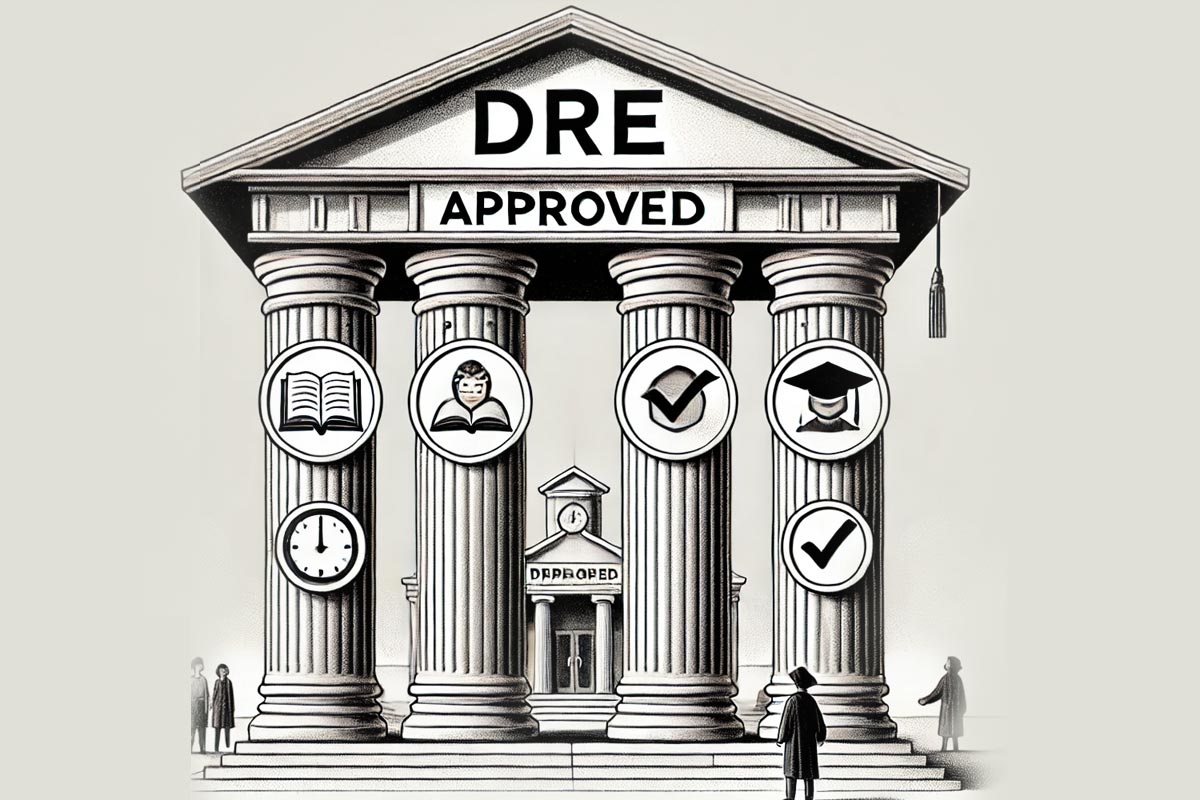
Are you dreaming of a lucrative and exciting real estate career in California? Don’t let an unapproved “real estate school” derail your plans. Here’s how to ensure your education meets the California Department of Real Estate (DRE) standards.
California’s real estate market is booming, offering lucrative opportunities for aspiring salespersons, brokers, property managers, and more. However, you need the proper real estate education before you can tap into its potential. The California Department of Real Estate sets the standards for real estate education and approves schools that meet those standards. This helps you avoid scams and ensures you're getting the quality education.
In this article, I wanted to walk you through:
By the end, you’ll be fully equipped to choose the right DRE-approved school and kickstart your journey toward becoming a licensed real estate professional in California.
The Role of the DRE
The California Department of Real Estate (DRE) is a state agency that protects people who buy, sell, or rent property. They do this by licensing agents, setting education standards, and enforcing real estate laws.
Its primary goals include:

Why DRE Approval Matters
When you enroll in a pre-licensing or continuing education course, the DRE must recognize that course as valid to qualify you for the state exam. DRE-approved schools must adhere to strict guidelines on curriculum, instructor qualifications, and operational practices.
DRE approval helps ensure you learn the most up-to-date information relevant to California’s real estate market. This makes you better prepared for the real estate exam and more knowledgeable in serving clients once licensed.
Choosing a school that isn't DRE-approved can lead to significant setbacks in your real estate career. The most immediate problem is that the coursework won't be recognized for licensing purposes. This means retaking those same real estate classes at a DRE-approved real estate school, costing you valuable time and money. You'll face the added expense of additional courses and the frustration of unnecessary delays.
These delays can create a ripple effect, causing you to miss time-sensitive job opportunities and lucrative commissions. While your peers who chose DRE-approved schools move forward, you'll face unnecessary setbacks. Choosing a DRE-approved education isn't merely about fulfilling a requirement; it's about creating a smoother path to licensure and building a strong foundation for a successful career. Making the correct choice now is a critical step toward achieving your goals in the competitive real estate market.

When a school applies for DRE approval, its programs undergo a meticulous and comprehensive review. The DRE evaluates:
Material must be college-level equivalent, comprehensive, up-to-date, and aligned with California real estate laws and market trends, ensuring you learn the most relevant information to thrive in California's competitive real estate industry. By meeting these standards, you can be assured of receiving a high-quality education that equips you to excel in California’s competitive real estate industry.
Instructors must have relevant credentials and experience in real estate. Qualified instructors, with their relevant credentials and experience in real estate, can provide practical insights and prepare you effectively for the state exam.
The school’s teaching methods should be engaging and compelling, whether online, in-person, or hybrid. Proper instructional design increases your chances of retaining information and passing your exam.
Policies for record-keeping, customer support, and fair testing must meet specific criteria. A well-structured school environment helps ensure a smooth, hassle-free educational experience.

One of your most important choices is deciding on the format that suits your learning style and lifestyle. Most DRE-approved schools like ADHI Schools offer one or more of the following:
Choose the format that best aligns with your schedule, budget, and personal learning preferences. But remember, always confirm that the specific course format is DRE-approved. Your choice is significant and should align with your educational goals.
Once you’ve identified a potential real estate school, use the steps below to confirm its DRE approval status. Remember, verifying a school’s credentials is your best defense against wasting time and money on non-compliant programs.
While verifying a school’s DRE approval status is straightforward, it’s crucial to stay alert for warning signs that a program may be misleading or non-compliant. Ignoring these signs could lead to wasted time, money, and a subpar education.
Use the DRE’s searchable database on its official website or contact the DRE directly.
Yes, many of the best DRE-approved online real estate courses offer the convenience of fulfilling your requirements virtually. Just ensure that the online format is approved, and you're all set.
If you accidentally take a non-approved course, you’ll likely have to retake it at a DRE-approved school. Non-approved coursework won’t count toward your license, potentially causing delays and extra expense.
Yes, our DRE Sponsor ID is S0348 and our continuing education ID is 6404.
The renewal period for real estate schools depends on the type of courses offered. Continuing Education (CE) courses typically require renewal every two years. However, for pre-licensing courses, there isn't a fixed renewal schedule, the course is valid as long as the material is up to date.
Choosing a DRE-approved school is a crucial step toward your California real estate license. This is more than just a formality; it's about getting a solid education that gives you the most current knowledge of real estate laws and practices. With this foundation, you'll be well-prepared, confident, and able to avoid costly mistakes on your path to licensure.
After completing your DRE-approved coursework, you’ll have exciting career paths to explore.
For instance:
California’s real estate industry is a vibrant landscape filled with endless opportunities, and the right education can pave the way for your success.
Key Takeaways
Key TakeawaysWant a faster, easier path to your California real estate license? ADHI Schools is DRE-approved, providing a streamlined and efficient way to complete your education. Enroll with ADHI Schools today and open the door to a thriving career in real estate.
Love,
Kartik
Real Estate Lead Generation: Master Networking & Referrals
The Ultimate Guide to Creating a Home Buying Checklist
Common Misconceptions About Cap Rates: Debunking the Myths

Founder, Adhi Schools
Kartik Subramaniam is the Founder and CEO of ADHI Real Estate Schools, a leader in real estate education throughout California. Holding a degree from Cal Poly University, Subramaniam brings a wealth of experience in real estate sales, property management, and investment transactions. He is the author of nine books on real estate and countless real estate articles. With a track record of successfully completing hundreds of real estate transactions, he has equipped countless professionals to thrive in the industry.